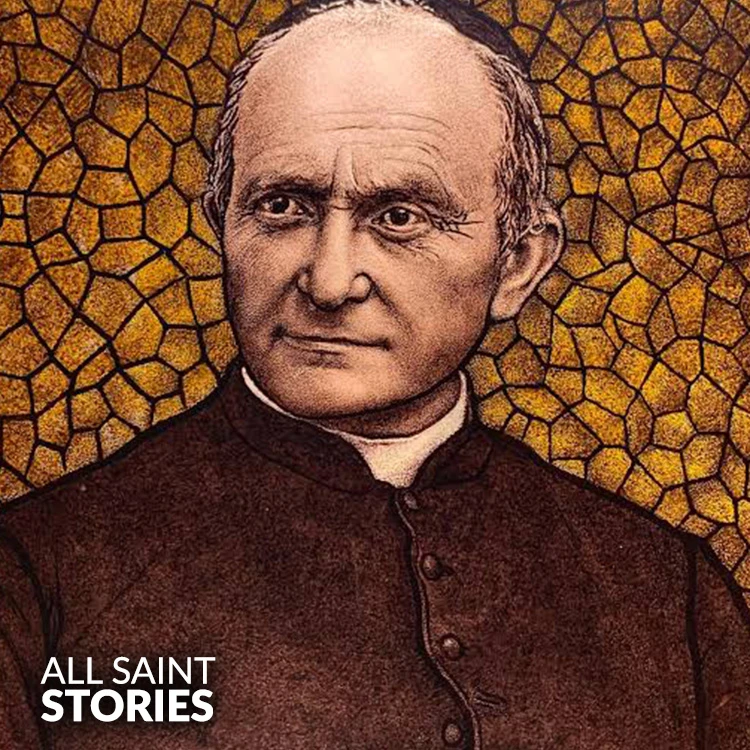"Lord, we thank You for the life and example of St. Arnold Janssen. Through his missionary zeal, may we be inspired to spread Your Word and love throughout the world. Grant us the grace to serve You with the same dedication, fervor, and humility that he did. Through his intercession, may we be blessed in our own mission to bring Christ to others. Amen."
ST. ARNOLD JANSSEN (PRIEST)
ST. ARNOLD JANSSEN (PRIEST)

St. Arnold Janssen was a German-Dutch Catholic priest and founder of three religious congregations. He established the Society of the Divine Word, the Missionary Sisters Servants of the Holy Spirit, and the Holy Spirit Adoration Sisters. His work focused on spreading the Gospel worldwide, leaving an enduring legacy in missionary and religious life. Canonized in 2003, St. Arnold’s life exemplifies unwavering faith and dedication to missionary work, continuing to inspire thousands of religious and lay people worldwide.
St. Arnold Janssen, born on November 5, 1837, in Goch, Kingdom of Prussia (now Germany), was the second of eleven children in a devout Catholic family. His early education took place at the Catholic Augustinianum High School in Gaesdonck and later at the University of Bonn, where he studied philosophy. After completing his studies, he was ordained as a priest on August 15, 1861. He began his career as a teacher at a secondary school in Bocholt, where he was known for his disciplined yet fair teaching methods. In the early years, Arnold's work was focused on education and pastoral ministry, but soon, he was called to a much broader mission.
In 1873, Arnold was appointed chaplain and director at the Ursuline convent of Kempen. It was during this period that he developed a deep concern for the universal mission of the Church. He recognized the urgency of spreading the message of Christ to all corners of the world. In response to this calling, and amid the anti-Catholic Kulturkampf policies in Germany, Arnold Janssen established a missionary center in Steyl, Netherlands, in 1875. This center would become the foundation for the Society of the Divine Word (SVD), a religious congregation dedicated to missionary work worldwide.
The Society of the Divine Word became an international mission network, which began to send missionaries across the globe to spread the Gospel, focusing on areas in Africa, Asia, and Latin America. Arnold's missionary zeal was not limited to men alone. He founded the Missionary Sisters Servants of the Holy Spirit (SSpS) in 1889, a congregation of women dedicated to the same missionary ideals. The sisters became known as the "Blue Sisters" because of their distinctive blue habit.
In 1896, Arnold established another religious community, the Holy Spirit Adoration Sisters (SSpSAP), known as the "Pink Sisters," who dedicated their lives to perpetual adoration of the Blessed Sacrament. These two congregations played a vital role in the spread of the missionary work of the Society of the Divine Word and continue to serve in many parts of the world today. Arnold’s vision of a global network of religious communities focused on prayer, service, and missionary outreach has had a profound and lasting impact.
Arnold Janssen's influence extended beyond the religious orders he founded. Through his example of selfless dedication to the Church's mission, he inspired countless individuals to devote their lives to spreading the Word of God. His efforts to train and form new missionaries created a ripple effect that continues to impact the Church’s missionary work to this day. After his death on January 15, 1909, in Steyl, Netherlands, his cause for sainthood was initiated. He was beatified by Pope Paul VI on October 19, 1975, and canonized by Pope John Paul II on October 5, 2003.
The miracle that led to his canonization was the healing of a Filipina teenager, Pamela Avellanosa, who had suffered a severe head injury but miraculously recovered after prayers to Arnold Janssen. Today, the Divine Word Missionaries, along with the Missionary Sisters Servants of the Holy Spirit and the Holy Spirit Adoration Sisters, continue to carry out Arnold’s missionary vision, spreading the Gospel in over 80 countries around the world.
Arnold’s life of prayer, service, and dedication to the spread of the Gospel through missionary work serves as an enduring example to Catholics and people of faith worldwide. His canonization recognized his extraordinary commitment to the universal mission of the Church, particularly in its outreach to the marginalized and remote corners of the world.
Video Not Found
The information on this website is compiled from various trusted sources. While we aim for accuracy, some details may be incomplete or contain discrepancies.
If you notice any errors or have additional information about this saint, please use the form on the left to share your suggestions. Your input helps us improve and maintain reliable content for everyone.
All submissions are reviewed carefully, and your personal details will remain confidential. Thank you for contributing to the accuracy and value of this resource.
Credits & Acknowledgments
- Anudina Visudhar (Malayalam) – Life of Saints for Everyday
by Msgr. Thomas Moothedan, M.A., D.D. - Saint Companions for Each Day
by A. J. M. Mausolfe & J. K. Mausolfe - US Catholic (Faith in Real Life) – Informational articles
- Wikipedia – General reference content and images
- Anastpaul.com – Saint images and reflections
- Pravachaka Sabdam (Malayalam) – Saint-related content and insights
We sincerely thank these authors and platforms for their valuable contributions. If we have unintentionally missed any attribution, please notify us, and we will make the correction promptly.
If you have any suggestion about ST. ARNOLD JANSSEN (PRIEST)
Your suggestion will help improve the information about this saint. Your details will not be disclosed anywhere.
© 2026 Copyright @ www.allsaintstories.com





 English
English
 Italian
Italian
 French
French
 Spanish
Spanish
 Malayalam
Malayalam
 Russian
Russian
 Korean
Korean
 Sinhala
Sinhala
 Japanese
Japanese
 Arabic
Arabic
 Portuguese
Portuguese
 Bantu
Bantu
 Greek
Greek
 German
German
 Dutch
Dutch
 Filipino
Filipino